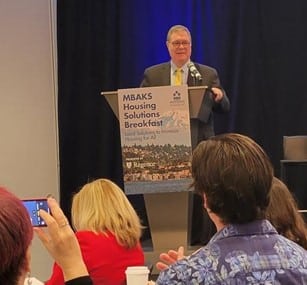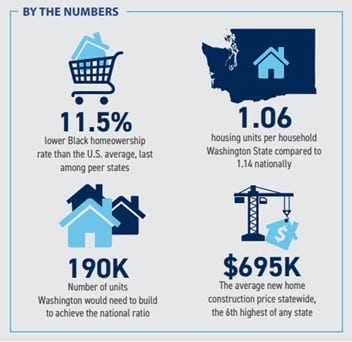
An inadequate supply of housing threatens our state’s competitiveness and poses challenges on many fronts, stated Washington Lieutenant Governor Denny Heck, keynote speaker at the Housing Solutions Breakfast presented by the Master Builders Association of King and Snohomish Counties (MBAKS).
Speaking at last month’s event, Heck highlighted some of the findings from a business competitiveness analysis of the state’s economy. That 105-page report, commissioned in 2021 by the Washington State Legislature, asseses the state’s strengths and examines barriers to quality growth.

Housing is the top barrier to economic vitality, Heck stated. “Production hasn’t keep pace with population or job growth, triggering persistent affordability and homelessness crises,” he added.
The speaker, whose background includes serving in Congress (2013 to 2021) and various positions with small businesses in the state, said building housing emerged as one of three “Big Ideas” in the Redefining Economic Success in Washington State report.
Heck framed the trio of ideas around the acronym BEaR:
Build more housing of all types that is affordable to all residents;
Equip the workforce for success and close the skills gap;
and
Revitalize entrepreneurship (and make it easier to do business).
The state’s housing crisis has “pernicious implications,” Heck remarked. To illustrate the problem, he outlined four concerns:
- Our state has the fewest number of housing units per household of any state in the country, and the crisis is worsening as the number of units built has not kept pace with household formation over the last decade.
- Inadequate supply puts strong upward pressure on home prices and rents. The report says 44% of Washington renter households are cost burdened, spending more than 30% of their income on housing.
- Chronically undersupplied housing is the principal driver of the state’s homeless crisis (30 per 10,000 residents, well above the U.S. average of 18 per 10,000 residents).
- Homeownership is becoming more unattainable, particularly for BIPOC households.

Among challenges the inadequate supply of housing causes are the creation of jobs, limits on economic productivity and growth, and wealth inequity for the next generation of residents.
Underproduction of housing also puts the state at a competitive disadvantage in attracting workers and businesses and can result in pricing people out of already precarious living situations.
The lieutenant governor also discussed a “burdensome regulatory environment” as an obstacle for builders. The Puget Sound region is the fourth most regulated region in the country for permitting and land use, he said, citing the Wharton Residential Land Use Regulatory Index. Only New York, San Francisco, and Providence outrank this region. Portland is #10.
Noting he has spent more time outside the public sector than within it, Heck told the audience he understands how hard it can be to start and do business in Washington.
The keynoter said there are lots of good efforts underway to address housing issues, but they are not commensurate with the problem. He believes a failure to adopt policies to allow more housing “costs us in many ways.” Providing local governments with resources for permit reform could help alleviate some of the barriers to housing production, he suggested.
The competitiveness study summarizes some of the efforts, including “recent notable legislation” to support affordable housing and address the housing crisis. It also delineates remaining barriers, as identified in the 2020 Housing Underproduction in Washington State report and the 2021 Housing Affordability report. Following Heck’s remarks, the Housing Solutions program featured a panel of elected officials and a builder who discussed their jurisdictions’ own experiences to increase housing choices and various approaches they are using to boost housing supply. (Editor’s note: see next report for a synopsis of the panel discussion.)